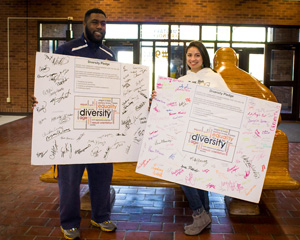Story by Abby Siegel, Assistant News Editor

Two students hold the Diversity Pledge boards in the Curris Center. The pledge has received half of the 5,000 signature goal.
Murray State’s diversity pledge continues to accumulate signatures since it started in Fall 2014 from a Yik Yak debacle showing hate towards multicultural students.
Students from the Emerging Scholars Institute – a mentoring program for multicultural students to develop their academic and leadership skills – created the pledge after multiple incidents of discrimination and hate were revealed on campus, building on work began by S.G. Carthell years ago.
The pledge calls for “accepting one another, learning from one another, creating an atmosphere of positive engagement and challenging bigotry.” It now has nearly 2,500 signatures with a goal of reaching 5,000. The pledge has been signed by hundreds of students as well as President Bob Davies, State Rep. Derrick Graham of Frankfort, Kentucky, State Sen. Reggie Thomas of Lexington, Kentucky, Renee Shaw of Kentucky Educational Television and Mayor Jack Rose.
The Office of Multicultural Affairs emphasized the pledge again during Fall 2015 when advertisements for Hijab Day, an event sponsored by the Muslim Student Organization where students could try on a hijab, were defaced with phrases like, “Hey wanna find out what it is like to be flogged and stoned too? … heck no!”
“The students involved in the Office of Multicultural Affairs thought it was important to stand in solidarity with them,” said Ivy Anderson, senior and Emerging Scholar from Memphis, Tennessee. “What better way than to reboot our diversity pledge – a pledge that puts the responsibility on Murray State students to do the right thing and make our campus a safe space for all.”
Anita Chitule, student services specialist in the Office of Multicultural Affairs, said diversity matters because we live in a world that branches beyond our own boarders.
“Diversity is important to all of us because we live in a global society and it is in our best interest to embrace the principles of diversity because of the value that diversity brings to our lives,” she said.
Chitule was responsible for coordinating efforts from various student organizations to sign the pledge and encourage students to create posters. She also verifies pledge signatures.
Anderson said she is an advocate for speaking about issues of diversity.
“I am always encouraging conversations about diversity because we don’t have them enough in safe spaces,” Anderson said. “Contrary to popular belief, not talking about it won’t make our problems go away.”
CONTINUING THE DIVERSITY PLAN
In addition to the pledge, the university diversity plan supports and defines the idea for the university. The previous plan ended in 2015 and an improved plan is being created.
The Council on Postsecondary Education has been working since October 2015 to develop the next iteration of the statewide university diversity policy, working with representatives from Kentucky public universities.
The policy is expected to be completed by this summer and shared with the universities, who will then be able to take steps to revise their university specific diversity plans for implementation in 2017. Until the new plan is in place, the Council on Postsecondary Education will evaluate the metrics of the current plan.
Background for the Statewide Diversity Plan Development provided by the Council on Postsecondary Education states that the university’s President’s Commission on Diversity and Inclusion is taking a proactive approach to the revised diversity plan. The established plan that ended in 2015 is being assessed to build a stronger plan for the coming years.
“Murray State is not a university that condones hateful rhetoric, and this pledge is a direct representation of our non-discriminatory policies,” Anderson said.
The Board of Regents approved Murray State Diversity Plan principle in August 2011 that had origins that developed from open forums to discuss diversity. From then, the plan has continued to develop in implantation and a progress report has been provided annually to ensure there is action taken toward creating a safe campus that continually embraces diversity.
According to the document, “the Commission continues to work toward the ongoing progress of having an ever-evolving campus climate open to diversity.”
“Regardless of how uncomfortable it may make us, conversations about diversity, involving all races and ethnicities, need to happen so that we can have diverse perspectives and figure out solutions for our generation and the next,” Anderson said.


























































































